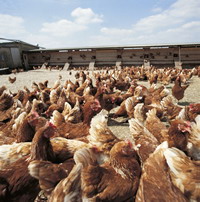Britain's poultry industry under attack of bird flu
Britain's poultry industry fell victim to the second outbreak of H5N1 bird flu this year, and the country's farmers say they fear the virus could hurt the hugely profitable trade in Christmas turkeys.

A bird flu outbreak at a poultry farm in eastern England was confirmed Tuesday as H5N1 - the same virulent strain that has killed scores of people around the world. In Europe, the disease has remained largely limited to birds.
Human infection is still a worry, but Britain's crisis-hit agriculture industry may be the most immediate victim.
"Obviously this is another huge blow to the farming industry," National Farming Union President Peter Kendall said Tuesday, explaining that the industry was still dealing with the effects of flooding as well as bluetongue and foot-and-mouth - animal diseases that struck livestock over the summer.
Foot-and-mouth and bluetongue do not affect humans, but they can sicken animals. The slaughter and restrictions imposed in their wake have hurt the farming industry.
Farmers were forbidden from taking their livestock to animal markets at one of the busiest times of the year for animal sales, and export bans imposed in the wake of the discovery of the diseases have already cost the farmers tens of millions in losses, the union said.
The discovery of H5N1 in eastern England, where more than a third of all British chickens and turkeys are produced, threatens to deal even more damage.
A fixture of Christmas dinners in Britain, some 10 million turkeys are bought over the holiday period, according to the British Poultry Council. Those sales amount to 360 million pounds (US$747 million; 511 million EUR).
Although no human bird flu cases have ever been traced to eating properly cooked poultry or eggs, the disease has spooked consumers in the past. Turkey sales dipped by a third when bird flu was discovered at another farm in Suffolk earlier this year, and have fallen even more dramatically in other European countries in the immediate aftermath of outbreaks, the council said.
"We're obviously concerned," said Jeremy Blackburn, a spokesman for the council. But he said there were important differences because the most recent outbreak occurred at a small farm for free range birds while the discovery of the virus earlier this year was at Bernard Matthews PLC, Britain's largest poultry producer.
He also noted that, unlike cattle, chickens and other birds tended to be raised, killed and packaged at centralized sites, which made it easier to prevent the spread of disease.
In the meantime, traditional events from falconing to pigeon racing have been banned, and the European Union said it would review the situation at a meeting of its committee on food and animal health next week.
British officials were first alerted to the outbreak Sunday after about 60 turkeys were found dead among birds owned by poultry producer Gressingham Foods, based in Woodbridge, Suffolk.
Since H5N1 began circulating widely in late 2003, hundreds of millions of birds have either died or been slaughtered because of the virus. The strain has killed about 200 people worldwide.
Subscribe to Pravda.Ru Telegram channel, Facebook, RSS!


